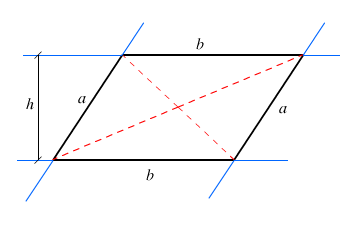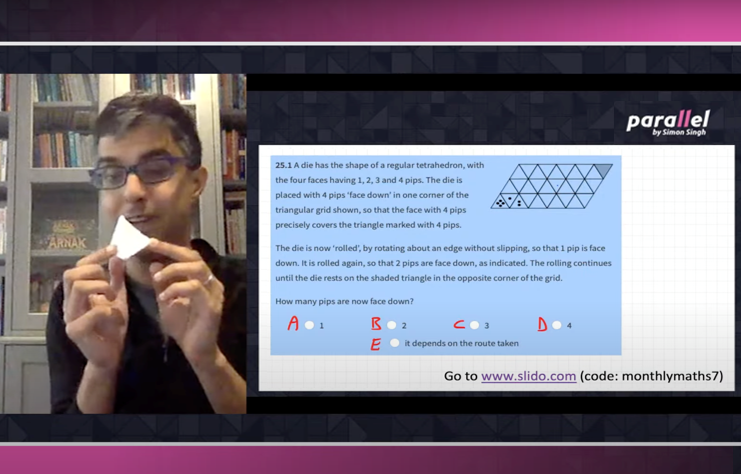Welcome to the Parallel Universe
Be challenged, get curious, do maths. Stretch your brain every week.
FAQs
This FAQ page will grow as students, parents and teachers ask us questions. If you have a particular question, then please read through the answers below.
If you cannot find the answer, then please contact us via the link at the bottom of the page.
Why is this website called “Parallel Universe’?
Well, parallel lines don’t cross over – check with Euclid if you don’t believe me – and in general the challenges that we set will not cross over with what students are doing in school
Our maths problems and topics will often involve ideas that are beyond the horizon of most classrooms.
The site used to be called just Parallel, but we changed to Parallel Universe as we added more features and opportunities. And there is even more in the pipeline.
What does a Parallelogram puzzle sheet look like?
Be prepared for anything. Parallelograms will involve paradoxes, history, videos, songs, online articles, online lectures, deep maths, weird maths, funny maths and maths in the headlines. Each Parallelogram has been curated by Simon Singh, and they consist of the sort of maths that he has enjoyed sharing with his own children. Importantly, we will choose the level of Parallelogram that seems right for a student’s age.
What topics are covered in a Parallel Circle?
Be prepared for anything, but we can tell you that each maths circle will be targeted to a particular age group, so students should check that they are joining the right maths circle each week. Each maths circle is led by a Ring Master, a brilliant maths teacher, who will choose the topic being covered in each session. In general, each maths circle will be a mix of new ideas and problem-solving.
What do students do if they get stuck on a Parallelogram puzzle sheet?
First, students should try harder. Second, they try even harder. Then, if students are still baffled, there will be hints. And they can also talk to family and friends. If they still get the answer wrong, the solution page will explain the answer and how the question could have been solved. Learning from mistakes is the best way to succeed in maths.
What should students do if their maths circles or Parallelogram puzzle sheets are regularly too easy or too hard?
There will always be a few problems that students find trivial or impossible, but if either extreme becomes routine, then students might consider joining a different maths circle (aimed at older or younger students) or signing up to a different Parallelogram (aimed at older or young students).
Students can change their maths circle by checking for upcoming events on the events page and turning up on a different day or at a different time. They can change their Parallelogram level by going to their dashboard and choosing a different Year/Age level, but they DO NOT need to change their year of birth.
Do students need to book their place on a maths circle each week?
No need to book. Just turn up. We have no limits on the size of our online maths circles, so everyone is welcome to turn up. If students have a Parallel Universe account, then they will be able answer questions, ask questions and chat to the Ring Master, and they will earn points towards their certificate. If students don’t have an account, then they can create a free account now or watch the maths circle without participating.
How can students find out about the next Parallelogram puzzle sheet or the next maths circle?
New Parallelograms appear each Thursday at 3pm (UK time), with a break during English school holidays and half-terms. Students will find the latest available Parallelograms automatically when they log into the Parallelograms section of the website.
The maths circle schedule is always available on our homepage or on the maths circles section of the website.
Can students only tackle Parallelograms one week at a time?
Students starting in September, at the start of the academic year in England can work through Parallelograms one per week, because a new one appears every seven days.
If students start later in the academic year, they can see all the past Parallelograms and it probably makes sense to work through them starting at Parallelogram #1, then #2, and so on. If students are able two or more Parallelograms per week, then can still complete all the Parallelograms for the year and earn a gold certificate.
What happens if a student forgets to do a Parallelogram during the week it was set?
Don’t worry. Students can complete Parallelograms at any time, and if they miss a few Parallelograms during the year then that is perfectly okay.
What happens if a student forgets to attend a maths circle?
Don’t worry. Students who miss one week (or two weeks) can just turn up the next week. Sometimes a maths circle will build on ideas discussed in the previous week, but each Maths Circle is also a stand alone session.
Why are maths circles not recorded, so that students can watch them whenever it is convenient?
maths circles are live events, with students all working together in real time on the same problems, or all listening at the same time and asking questions that help each other. The web already has recorded maths lectures, but maths circles are fundamentally different, because our students are actively taking part in the maths circle, not merely passively watching from the sidelines.
Parallelograms

Weekly maths challenges: 15-30 minutes of fun and challenging material that goes beyond school maths: mystery and history, activities and oddities, puzzles and problems.
Parallel Circles

Live maths circles led by Simon and other leading maths educators. Learn how to become a better problem-solver and thinker. Interact with live chat and polls.
Awards

Your every effort will be rewarded! Score points, unlock badges and earn certificates and diplomas as you solve Parallelograms and attend Circles.